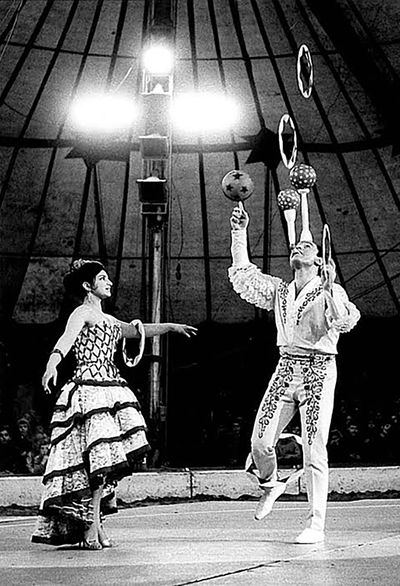Edoardo Raspini
From Circopedia
Juggler
By Doiminique Jando
Edoardo Raspini (1928-2015) was one of the great jugglers of the mid-twentieth century, one of the last proponents of the classical Italian style popularized by Enrico Rastelli. He was born in Russia on January 19, 1928 to Oreste and Tamara Raspini. The Raspinis were one of many old Italian circus families established in the Russian Empire prior to the Bolshevik Revolution—like the Truzzis and the Cinisellis, for instance. (Although his parents didn’t settle there, Rastelli was also born in Russia.) Tamara, Edoardo’s mother, was pure Russian.
From Imperial Russia To Western Europe
Edoardo made his performing debut at age seven in his parents’ free ladderUnsupported vertical ladder on which acrobats perform balancing and/or juggling tricks. act, the Three Raspinis. His parents had previously been part of the juggling act of the Four Zerbinis, and they trained Edoardo as a juggler, thus adding to the family’s package of offerings. By age fourteen, he was already an accomplished juggler; he made his solo debut in 1942, at Circus Mikkenie-Strassburger in Holland, with his beautiful sister, Elvira, as his assistant. Beside his amazing technical abilities, Edoardo was very charismatic and good-looking, which contributed to his success; he would later be known as "The Don Juan of the Ring."Like many Russian-Italian performers after the Bolshevik Revolution and during World War II, the Raspinis decided to remain in Western Europe as soon as they could secure a few contracts there. In 1945, Edoardo and his family were still among the Mikkenie-Strassburger’s featured acts at the Cirque Royal in Brussels. Then they went on to work with Cirkus Scott in Sweden, and in the winter of 1947-1948, they hit the jackpot and appeared with one of Europe’s most prestigious shows, Bertram Mills Circus at Olympia, in London—where Edoardo presented his extraordinary juggling act and performed with his parents and his sister in their free ladderUnsupported vertical ladder on which acrobats perform balancing and/or juggling tricks. act—which had grown into becoming the Six Raspinis.
The Raspinis toured with the traveling Bertram Mills Circus from 1950 to 1952, but they also appeared in other leading circuses, such as the Tower Circus in Blackpool (1948), Cirque Medrano in Paris (1949), Circus Kronebau in Munich (1952), and from 1953 to 1957, Circus Krone in Germany, among others. In the winter of 1954-1955, Edoardo’s juggling act was featured alone at the Kelvin Hall Circus in Glasgow. From then on, he would continue to work independently of his family: Oreste and Tamara had retired from performing, and went on to run Circus Krone’s food concessions and restaurant, a position they held for thirty-three years. (Elvira married the chimpanzee trainer Amletto Sciplini.)
Edoardo pursued his brilliant juggling career in all major European circuses, as well as at the legendary Moulin-Rouge cabaret in Paris, where he performed from 1965 to 1969. He also appeared on television, notably on CBS’s The Ed Sullivan Show in the United States in 1957, and on French television’s long-running circus show, La Piste aux Étoiles, in 1956 and 1964. In the sixties, Edoardo added a second act to his original juggling act, The Rennos, an acrobatic trio on double bars (the ancestor of the Russian barreFlexible pole, held horizontally by two catchers, or under-standers, with which they propelled a flyer in acrobatic figures from and to the pole.), of which he was one of the two bottom men. His partners were two Italian acrobats, named Antonio and Sergio. In 1962, Edoardo Raspini was awarded the first ever Rastelli Trophy, which was presented at the Festival Internationale dei Giocolere (International Juggling Festival) held in Rastelli’s hometown of Bergamo, Italy.
Circus Agent
Edoardo Raspini retired from performing in 1974, and settled in Grünwald, near Munich in Germany, where he opened a circus talent agency; his proficiency in German, English, French, and Italian made him a precious interlocutor between artists and producers in multi-lingual Europe. Furthermore, when Russian acts became available to Western Europe after the fall of the Soviet Union, Edoardo, whose native language was Russian, was one of the few agents able to connect with them, and he became instrumental in opening the European market to Russian artists. He also organized the Moscow Circus’s tours that Franzi Althoff presented in Germany in the 1990s, and which made Oleg Popov a household name in that country—where the legendary Russian clown eventually settled.
In 1998, Edoardo published his memoirs, Geh zum Teufel, Herr Direktor!—which translates in English as Go to Hell, Mr. Director! In it he settled scores with a few circus directors with whom he had dealt, which, not surprisingly, didn’t endear him to their corporation: His career as an agent suffered considerably from his literary rants, and Edoardo eventually retired from show business and re-settled in Bussolengo, near Verona, in Italy—in a region that is home to many Italian circus families.
Edoardo Raspini passed away on January 12, 2015, at age eighty-seven. His funeral took place two days later at the Church of San Maria Maggiore in Bussolengo, in the presence of many Italian circus artists and aficionados, who came to pay tribute to one of the most celebrated jugglers of the twentieth century.
Suggested Reading
- Edoardo Raspini, Geh zum Teufel, Herr Direktor! (Hanau, Haag + Herchen, 1998) — ISBN 978-3-89846-417-8
See Also
- Video: The Rennos, double bar act at Paris's Cirque d'Hiver (1968)






